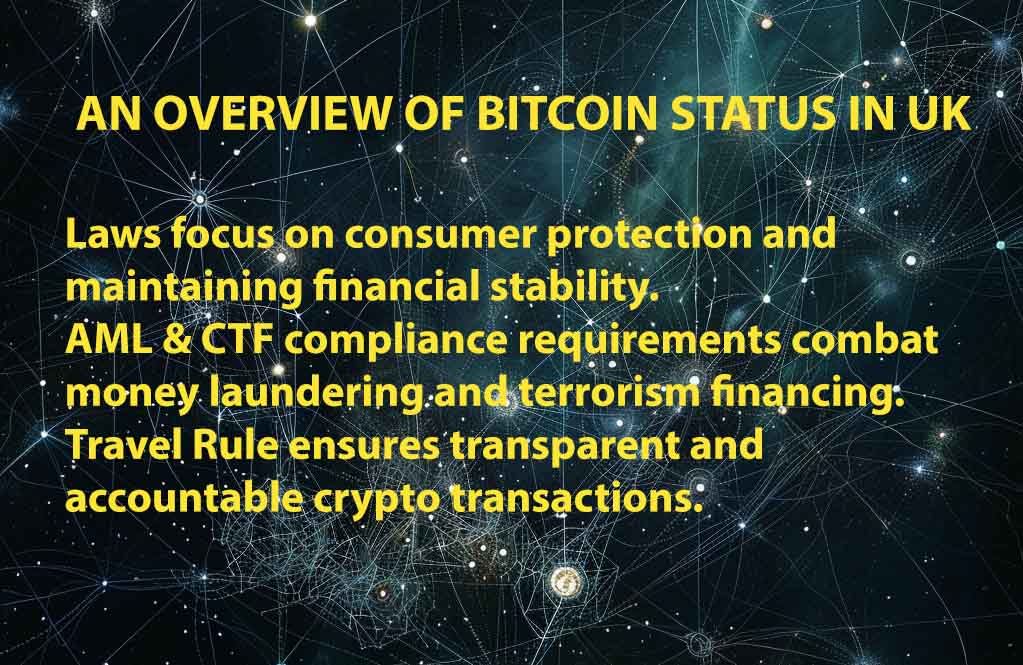The UK government has implemented a comprehensive regulatory framework to address digital assets’ unique challenges and opportunities. While specific regulations directly addressing digital currencies are still evolving, the government recognizes Bitcoin as a legitimate asset. The Financial Conduct Authority (FCA) oversees these regulations, requiring crypto businesses to register and adhere to strict guidelines such as anti-money laundering (AML) and counter-terrorist financing (CTF) standards. To understand more about Bitcoin regulation in UK, we’ll explore how the UK’s existing AML framework applies to Bitcoin and the FCA’s growing influence on cryptoasset promotion. We will also look into the government’s plans for stablecoin regulation and how it will shape the future of Bitcoin in the UK.
A Highlight of Bitcoin Regulation in UK
- The UK is aiming to be a crypto hub.
- Firms dealing in crypto assets must register with the Financial Conduct Authority (FCA)
- The FCA’s role is to ensure that crypto activities are conducted safely and transparently.
- The UK is establishing specific regulations for stablecoins, a type of cryptocurrency pegged to a real-world asset like the dollar.
- Virtual Asset Service Providers (VASPs) are required to verify customer information during transactions.
An Overview of Bitcoin Status in UK
The UK cryptocurrency market is huge. The cryptocurrency economy has an average annual turnover of over £84 billion. It is estimated that the sector could reach almost £70 billion by 2027. Additionally, as of 2023, 2.5% of the UK’s adult population, or 1.3 million people, owned Bitcoin.
This rapid growth will impact the country’s economy and will need to be regulated. The country wants to position itself as an attractive place for crypto firms to set up shop. Rishi Sunak (the UK’s past prime minister) once commented that he desired to make the UK a “global hub for cryptoasset technology,” showing us that cryptos have a bright future.
If you are a player in the crypto industry, you must fully understand the changing regulations resulting from this upsurge in popularity.
In this article, we will look at the current restrictions, UK laws on Bitcoin, and tax implications. The failure of cryptos will also impact the development of regulations and policies so keep reading to stay in the know.
What are the Laws Surrounding Bitcoin Regulation in the UK?
Regulation of Bitcoin and other cryptocurrencies is challenging because of their unique characteristics. Their decentralized nature makes it difficult to apply traditional forms of oversight that ensure compliance with anti-money laundering (AML) policies. There are also concerns about investor protection and overall market integrity.
Despite this complexity, Bitcoin regulation in UK is governed by several key laws and regulatory frameworks designed to ensure consumer protection, financial stability, and adherence to anti-money laundering (AML) and counter-terrorist financing (CTF) standards. Here are the primary laws and regulations:
Anti-Money Laundering (AML) & Counter-Terrorism Financing (CTF) Requirements
AML and CTF policies for crypto businesses are essential in mitigating risks associated with investing or trading digital assets. AML/CTF requirements ensure the integrity of the UK’s financial system. The FCA has the power to enforce these guidelines and conduct frequent inspections.
AML/CTF compliance in the UK is guided by the Money Laundering, Terrorist Financing, and Transfer of Funds (Information on the Payer) Regulations 2017 (MLRs). These MLRs classify any crypto asset business (CAB) as either ‘cryptoasset exchange providers’ or ‘custodian wallet providers’. As mentioned above, you must register with the FCA and comply with AML/CTF requirements.
There are six major requirements to ensure AML/CTF compliance, and I’ll explain these briefly below.
- Conduct thorough customer due diligence (CDD) to verify your customer’s identity and understand their risk profile.
- Conduct ongoing due diligence by monitoring transactions throughout your relationship with the customer.
- Implement AML policies and procedures.
- Monitor transactions for suspicious activities.
- Report any suspicious activities to relevant agencies such as the National Crime Agency.
- Appoint a Money Laundering Reporting Officer (MLRO) to oversee and ensure AML/CTF compliance.

But there are some loopholes when trying to enforce the above policies, namely:
- Crypto transactions are marked as pseudonyms of the actual characters that identify a transaction. This makes it difficult to identify and verify the people making transactions.
- Due to the rapid innovation of crypto technologies, the pace of AML/CTF adaptation must keep up. This requires adapting regulatory frameworks to address emerging risks.
- The decentralization of Bitcoin and other cryptos, which is the essence of blockchain technology makes it difficult to facilitate cross-border cooperation.
In line with the ever-evolving AML/CTF policies, crypto-regulation in the UK has increased in scope. The FCA has been granted powers to impose the requirements we mentioned above. Another big move aimed at improving regulation is the development of the Financial Action Task Force (FATF) to help combat threats to the international financial system.
Fun (or not so fun) fact: FTX, once the world’s largest crypto-exchange crashed in November 2022 after Coindesk exposed that the exchange was over-leveraged. This caused market-wide panic and widespread panic selling and liquidations.
The Financial Services and Markets Act (FSMA) 2023
The Financial Services and Markets Act (FSMA) 2023 is a significant piece of legislation that overhauled the regulatory landscape for financial services in the UK. It is enforced by the Financial Conduct Authority (FCA), the main financial regulator of cryptos in the UK. The FCA acts as the oversight body and ensures compliance with FSMA requirements.
- Regulatory Efficiency and Streamlining. The act consolidates various regulatory bodies under the Financial Conduct Authority (FCA) and Prudential Regulation Authority (PRA), aiming to streamline regulatory processes and reduce duplication of efforts. This fosters a more efficient and coordinated regulatory environment.
- Modernization and adaptability. The act updates regulations to keep pace with the rapidly evolving financial market. This includes areas like cryptoassets and other technological advancements that weren’t explicitly addressed in the previous framework. Acknowledging these developments, the FSMA 2023 aims to ensure regulations are relevant and effective in the current financial climate.
- Consumer Protection: A crucial role of the FSMA 2023 is prioritizing consumer well-being. It introduces a new “Consumer Duty” that requires financial firms to:
- Act in the consumers’ best interests.
- Ensure fair treatment throughout the financial product lifecycle.
- Offer suitable products that align with the consumer’s needs and risk tolerance.
- Facilitating Innovation: The Financial 2023 acknowledges the importance of innovation in financial services. It allows for “regulatory sandboxes” where businesses can test innovative financial products and services in a controlled environment. This facilitates developing and implementing new financial solutions while managing potential risks.
- Stability and Risk Management: The act strengthens the UK’s financial stability by granting the Bank of England enhanced powers to oversee Financial Market Infrastructure (FMI) and Central Counterparties (CCPs). This enables closer monitoring and intervention to prevent systemic risks.
It’s essential to note that FSMA 2023 is still in the early stages of implementation. Its full impact will continue to unfold as regulations are embedded and the financial sector adjusts.
Upon perusal of the Act, we can establish that some of these include:
- Initial coin offerings (ICOs)
- Cryptocurrency exchanges/markets
- Custodial services
If you are involved in the business of exchanges and custodial services, you might be required to get licensed by the FCA before beginning operations.
Are you involved in offering ICOs? You must follow the standards that govern investor disclosure and security offerings before issuing any tokens.
Read: 10 Tips to Launching a Successful ICO Project
Other Bitcoin regulations in the UK revolve around AML/CTF policies and tax laws. All of these fall under the scope of FCA – so why don’t we take a brief look at each?
Financial Conduct Authority (FCA) Oversight
The Financial Conduct Authority (FCA) is critical in overseeing the UK’s financial services industry. Here are the key aspects of the FCA’s role in crypto oversight:
- Registration and Authorization. Firms offering financial services must be authorized by the FCA to ensure they meet minimum standards for financial stability and conduct.
- Anti-Money Laundering (AML) and Counter-Terrorist Financing (CTF). The FCA prevents financial crime by ensuring firms conduct a Know Your Customer (KYC) process, conduct Customer Due Diligence (CDD), and report suspicious activities to the authorities.
- Consumer Protection. The FCA prioritizes protecting consumers from financial harm. It achieves this through setting rules and standards for how financial products are sold and marketed ensuring fair treatment and appropriate product suitability for consumers.
- Market Integrity and Stability. The FCA works to maintain fair and orderly markets by preventing market abuse through market manipulation and misleading financial information. The Financial Conduct Authority also promotes competition and ensures firms can manage risks effectively.
- Innovation. The FCA provides guidance for firms developing new financial products to ensure they are fair and meet customers. It also serves as a regulatory sandbox and allows businesses to test innovative financial products and services in a controlled environment.
- Focus on Cryptoassets: The FCA’s role has recently expanded to include oversight of cryptoasset activities. This includes:
- Registration of cryptoasset businesses: Under the Money Laundering Regulations (MLRs), firms dealing in cryptoassets must register with the FCA.
- Regulation of cryptoasset promotions: Since October 2023, businesses marketing cryptoassets to UK consumers need FCA registration or approval for their promotional content.
- Oversight of specific cryptoasset activities: The FCA can regulate specific activities related to cryptoassets, such as crypto exchanges and custody services.
The FCA’s oversight ensures that the UK crypto market operates in a safe, transparent, and fair manner. By enforcing strict regulatory standards, promoting consumer protection, preventing market abuse, and supporting innovation, the FCA plays a pivotal role in shaping the future of cryptocurrency in the UK.
Travel Rule Compliance
The Travel Rule Compliance is a regulation aimed at combating money laundering and terrorist financing in crypto transactions. It mandates cryptoasset businesses Virtual Asset Service Providers (VASPs), like exchanges or custodians, to collect and share specific information about the originator and beneficiary of cryptoasset transfers. This information typically includes names, addresses, and account numbers.
When a user transfers a certain amount of cryptocurrency (usually above 1,000 euros), the sender’s and receiver’s details must be exchanged. This helps track the flow of funds and enhances transparency in the crypto ecosystem.
For this reason, VASPs must have a system to securely transmit this customer data to other involved VASPs when a crypto transaction occurs. This can be done through various methods but should ensure data privacy and security.
Overall, the Travel Rule represents a significant step towards making crypto transactions more transparent and accountable. However, there are challenges around implementation, privacy, and security.
Taxation Laws
Bitcoin and other cryptocurrencies are subject to several taxation laws in the UK. The tax treatment of crypto assets depends on the nature of the activities and the parties involved. The main Bitcoin laws tax include;
- Capital Gains Tax (CGT). This is the most common scenario for individuals buying, holding, and selling Bitcoin (except to their spouses). The tax rate for CGT ranges from 10% to 20%, depending on your overall gains.
- Income Tax. If you’re actively trading or making an income from Bitcoin, you’ll pay Income Tax. Mining income is also subject to Income Tax if the mining activities constitute a trade. Income from these activities is taxed at your income tax rate depending on your tax bracket (20%, 40%, or 45%).
- Corporation Tax. Companies that buy, sell, or exchange cryptocurrencies as part of their trade must pay Corporation Tax on the profits derived from these activities.
Like many Bitcoin regulations in the UK, it’s essential to keep good records of your transactions, including purchase prices, sale prices, and any additional costs. This will help you accurately calculate your capital gains or income when filing your tax return.
Overall, The UK has a comprehensive taxation framework for cryptocurrencies, ensuring that both individuals and businesses report and pay taxes on their crypto activities. Compliance with these tax laws is crucial to avoid penalties and ensure accurate tax reporting.
Crypto Trading Restrictions

The Bitcoin regulation in the UK covers the crypto trading restrictions. We have covered most of the restrictions above. The limits can also be termed as Bitcoin laws in the UK. They include;
- You can sell, hold or buy Bitcoin and other cryptocurrencies in the UK. There are no restrictions on the act of trading itself.
- Businesses dealing in cryptoassets (exchanges, custodians) must register with the Financial Conduct Authority (FCA).
- Cryptoasset firms must collect and share information about the sender and receiver of crypto transactions with other involved firms.
- Crypto exchanges and other cryptocurrency businesses must comply with strict AML regulations.
- The FCA has imposed restrictions on the advertising and promotion of cryptocurrencies to ensure that advertisements are clear, fair, and not misleading.
- Individuals and businesses must report crypto trading activities for tax purposes.
- Crypto businesses must provide clear warnings to consumers about the risks associated with investing in cryptocurrencies.
Is it Legal to Mine Bitcoin in the UK?
Yes, it is legal to mine Bitcoin in the UK. However, it is essential to note that BTC earned through mining is considered income for tax purposes in the UK. The tax treatment depends on your mining activity.
Bitcoin mining requires significant computing power, which translates to high energy consumption. This raises environmental concerns. While not illegal, it’s essential to be mindful of the environmental impact. Miners must also ensure compliance with AML regulations, conduct Customer Due Diligence (CDD), be registered with the Financial Conduct Authority (FCA), and comply with its rules.
Crypto Regulations in the UK – What Does the Future Hold?
As the UK works to create a more robust regulatory environment concerning cryptocurrencies and their trading activities, regulators might be faced with some key duties that include:
- Initiating a regime that is a world leader in crypto lending.
- Creating a regulatory framework for the use of stablecoins.
- Strengthening and enforcing rules around the crypto market/exchanges.
- Widening the scope of regulated crypto activities.
- Increasing the operational resilience of crypto-based firms.
- Implementing regulations that will protect customers from market manipulation.
- Exploring the possibility of a Central Bank Digital Currency (CBDC) to change the regulatory landscape further.
The Economic Secretary to the Treasury reiterated in an official statement that the country aims to protect customers’ interests while encouraging industry growth and development.
To Sum It Up
With the growing recognition of crypto assets as a legitimate asset class, financial markets are continuously evolving, and with them, so are the regulations around them. The regulatory landscape surrounding Bitcoin in the UK is a work in progress. While the current framework focuses on AML/CTF compliance, consumer protection, and specific product restrictions, the future might hold more comprehensive regulations. As we move deeper and deeper into the digitization of cryptos, our leaders must recognize innovation and create policies that balance customer rights with economic growth. Hopefully, this article provides sufficient information to allow you to delve into the Bitcoin regulation in the UK without breaking any laws or flouting regulations. We’ll watch for the next big move in how cryptos are regulated in the United Kingdom.
Frequently Asked Questions(FAQs)
[answerFAQNo, it’s not illegal to sell Bitcoin for cash in the UK. However, you must comply with AML/CTF regulations. And ensure both parties are comfortable with the arrangement.[/answerFAQ]


